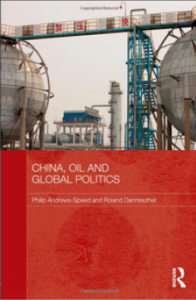 China’s rapid economic growth has led to a huge increase in its domestic energy needs. This book provides a critical overview of how China’s growing need for oil imports is shaping its international economic and diplomatic strategy and how this affects global political relations and behaviour.
China’s rapid economic growth has led to a huge increase in its domestic energy needs. This book provides a critical overview of how China’s growing need for oil imports is shaping its international economic and diplomatic strategy and how this affects global political relations and behaviour.
Part One is focused on the domestic drivers of energy policy: it provides a systematic account of recent trends in China’s energy sector and assesses the context and processes of energy policy making, and concludes by showing how and why China’s oil industry has spread across the world in the last fifteen years. Part Two analyses the political and foreign policy implications of this energy-driven expansion and the challenges this potentially poses for China’s integration into the international system. It examines a number of factors linked to this integration in the energy field, including the unpredictabilities of internal policymaking; China’s determination to promote its own critical national interests, and the general ambition of the Chinese leadership to integrate with the international system on its own terms and at its own speed.
The highly topical book draws together the various dimensions of China’s international energy strategy, and provides insights into the impact of this on China’s growing international presence in various parts of the world.
Andrews-Speed, P. and R. Dannreuther (London: Routledge, 2011), 225 pp
“The book is laudable in its interdisciplinary approach, particularly the effort to combine energy policy issues with international relations analysis. It is also sensitive to the dynamic perspective underlying the interests of different stakeholders…the book will be of interest to international relations experts, China experts, policymakers and investors who want to obtain firsthand knowledge of the energy dynamics in the country.” – I.A. Siddiky, Oil, Gas & Energy Law Intelligence, Vol. 9 – issue 5 (October 2011)
“If China’s foreign policy on energy is of concern to you, then Philip Andrews-Speed and Roland Danreuther’s new book is indispensable. In 170 tightly written pages the authors synthesise their deep knowledge of Chinese domestic policymaking with a broad and sophisticated understanding of international relations. The result is a complex argument about how domestic and international considerations have interacted to shape the international behaviour of the Chinese government and of its oil companies. In contrast to most foreign policy discussions, the authors emphasize the importance of domestic policy considerations and path dependency in the energy sector in determining much of China’s international behaviour.” – Deborah Seligsohn, Europe’s World, Autumn 2011

